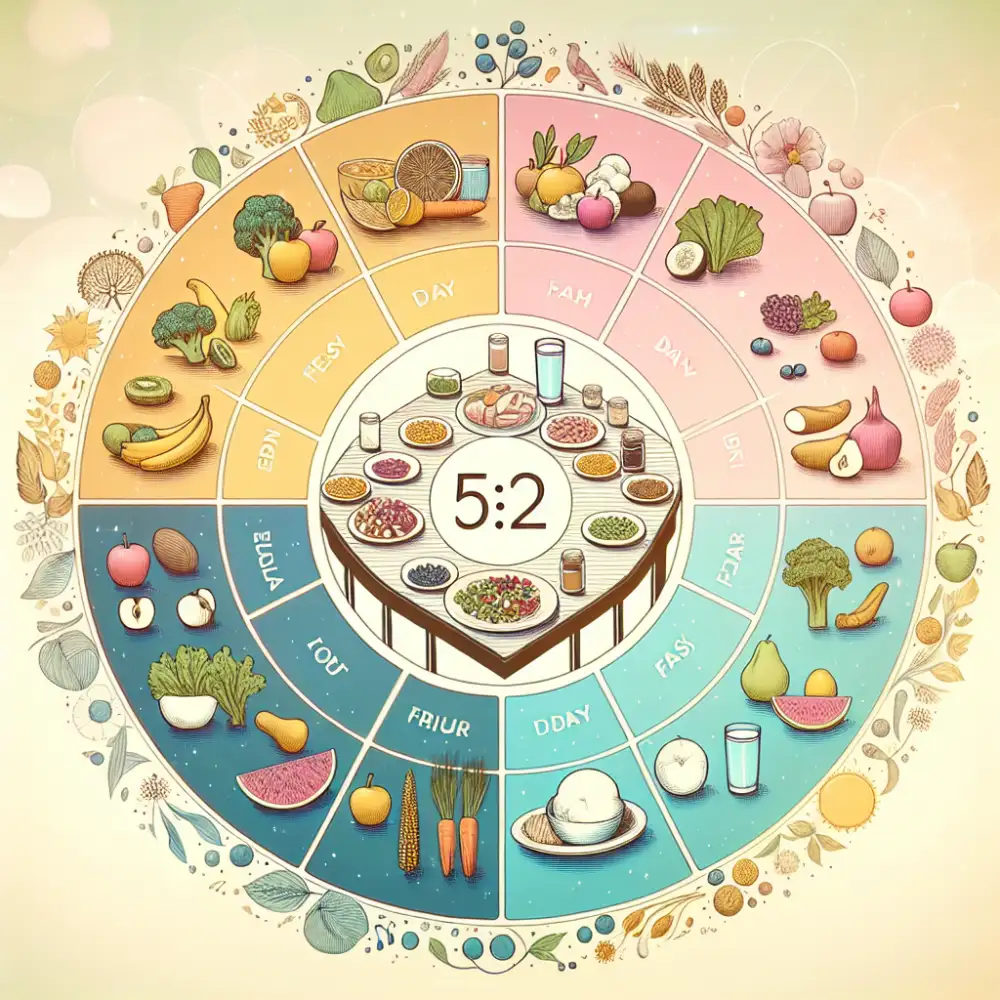Unlock Health Benefits with the 5:2 Diet

Weight loss
The 5:2 diet, also known as the fast diet, is a popular intermittent fasting method. It cycles between five days of eating normally and two non-consecutive days of significantly reduced calorie intake, typically around 500-600 calories. This pattern differentiates it from daily calorie restriction, making it more appealing to some individuals who find continuous dieting challenging.
Proponents of the 5:2 diet highlight its potential for weight loss. By limiting calorie intake on fasting days, the body is thought to tap into stored fat for energy, leading to a calorie deficit and subsequent weight loss. Research on the 5:2 diet and its impact on weight management has shown promising results. Studies suggest that it can be as effective as traditional calorie restriction diets for short-term weight loss. Some studies even indicate potential benefits for fat loss, particularly in the abdominal area.
However, it's crucial to approach the 5:2 diet with a balanced perspective. While it can be effective for some, individual results may vary. Factors like age, metabolism, activity level, and overall health can influence outcomes. Additionally, the long-term sustainability of this diet is debated. Adhering to strict fasting days can be difficult for some, potentially leading to nutrient deficiencies if not managed carefully.
Before making any significant dietary changes, consulting a healthcare professional or registered dietitian is essential. They can provide personalized guidance based on your health status and goals, ensuring the chosen approach aligns with your needs and minimizes potential risks. Remember, sustainable weight loss is a journey, not a race, and finding a balanced approach that suits your lifestyle is key.
| Feature | 5:2 Diet | Calorie Restriction Diet |
|---|---|---|
| Days of Restriction | 2 days per week | Typically every day |
| Restriction Method | Severe calorie restriction (500-600 calories) for 2 non-consecutive days | Reduced calorie intake daily (e.g., 1200-1500 calories) |
| Flexibility | High - You choose your fasting days | Moderate - Some flexibility depending on the chosen calorie target |
| Potential Benefits | Weight loss, may improve insulin sensitivity | Weight loss, may improve various health markers depending on the diet quality |
Heart health
The 5:2 diet, also known as intermittent fasting, has gained popularity for its potential weight loss benefits. But did you know that this eating pattern may also have positive effects on your heart health? Let's delve into the science behind it.

The 5:2 diet involves eating normally for five days a week and restricting calories to 500-600 for two non-consecutive days. This calorie restriction, when done safely and effectively, can lead to weight loss, which is a major plus for your heart. Carrying excess weight, especially around the midsection, puts extra strain on your heart, increasing the risk of heart disease.
Studies have shown that the 5:2 diet can be as effective as traditional calorie restriction for weight loss and improving heart health markers. For instance, research suggests that this eating pattern can lower blood pressure, a key risk factor for heart disease. High blood pressure makes your heart work harder, and over time, can damage your arteries.
Furthermore, the 5:2 diet may improve cholesterol levels. It can help reduce LDL cholesterol, often referred to as "bad" cholesterol, which can build up in your arteries and increase your risk of heart attack and stroke. Some studies also suggest a potential increase in HDL cholesterol, the "good" cholesterol that helps remove LDL cholesterol from your arteries.
Beyond weight and cholesterol, the 5:2 diet may also improve insulin sensitivity. Insulin resistance, a condition where your body doesn't respond to insulin properly, is linked to an increased risk of heart disease. By improving insulin sensitivity, the 5:2 diet could potentially lower this risk.
While the 5:2 diet shows promise for heart health, it's essential to consult your doctor or a registered dietitian before making any significant dietary changes, especially if you have any pre-existing health conditions. They can help determine if this eating pattern is appropriate for you and guide you on how to implement it safely and effectively.
Blood sugar control
The 5:2 diet, also known as intermittent fasting, involves eating normally for five days a week and restricting calories for two non-consecutive days. Typically, this means consuming around 500-600 calories on fasting days. While this dietary approach has gained popularity for weight management, its impact on blood sugar control is of particular interest, especially for individuals with type 2 diabetes or those at risk.
Research suggests that the 5:2 diet can be effective in improving blood sugar control. Studies have shown that this type of intermittent fasting can lead to significant reductions in fasting blood sugar levels and HbA1c, a marker of long-term blood sugar control. These improvements are likely due to several mechanisms.
Calorie restriction, a key component of the 5:2 diet, plays a crucial role in blood sugar regulation. When you consume fewer calories than your body needs, it starts burning stored glucose (sugar) for energy, leading to lower blood sugar levels. Additionally, intermittent fasting can improve insulin sensitivity. Insulin is a hormone that helps your body use glucose for energy. When your body becomes more sensitive to insulin, it can effectively remove glucose from the bloodstream, preventing prolonged periods of high blood sugar.

Furthermore, the 5:2 diet may promote weight loss, which is beneficial for blood sugar control. Losing even a small amount of weight can improve insulin sensitivity and reduce the risk of developing type 2 diabetes. It's important to note that while the 5:2 diet shows promise for blood sugar control, it's not a replacement for traditional diabetes management strategies.
Individuals with diabetes or those taking blood sugar-lowering medications should consult their healthcare provider before making any dietary changes, including starting the 5:2 diet. Close monitoring of blood sugar levels is essential, and adjustments to medication may be necessary.
It's also crucial to emphasize that the 5:2 diet should be approached with caution. Fasting days should prioritize nutrient-rich foods to ensure adequate vitamin and mineral intake. Staying hydrated is crucial, especially on fasting days.
In conclusion, the 5:2 diet can be a valuable tool for improving blood sugar control, potentially aiding in weight management and reducing the risk of type 2 diabetes. However, it's essential to consult a healthcare professional before making any significant dietary changes, especially for individuals with existing health conditions.
Brain function
The 5:2 diet, or intermittent fasting, has gained popularity for its weight loss potential. But what about its effects on the brain? Research suggests that restricting calorie intake, like in the 5:2 diet, could have some interesting effects on brain function.
Animal studies have shown that intermittent fasting can stimulate the growth of new brain cells, a process called neurogenesis. This process is crucial for learning and memory. Additionally, animal studies suggest that intermittent fasting may enhance the production of a protein called brain-derived neurotrophic factor (BDNF). BDNF is like fertilizer for your brain cells, helping them survive and thrive. It plays a role in learning, memory, and mood regulation.
Human studies on the 5:2 diet and brain health are more limited. Some small studies have found that intermittent fasting can improve cognitive function, including memory and attention. However, more research is needed to confirm these findings and understand the long-term effects.
While some studies show promise, it's important to remember that everyone's brain is different. What works for one person may not work for another. It's also crucial to approach any dietary changes with caution, especially if you have underlying health conditions.
If you're considering the 5:2 diet or any form of intermittent fasting, consult with your doctor or a registered dietitian. They can help you determine if it's safe and appropriate for you and guide you on how to implement it safely.

Potential risks and side effects
While the 5:2 diet can be an effective way to lose weight for some people, it's important to be aware of potential risks and side effects.
Fasting can lead to headaches, dizziness, and difficulty concentrating. This is because your blood sugar levels drop when you don't eat for an extended period. Drinking plenty of water and unsweetened beverages like herbal tea can help mitigate these effects. If you experience severe headaches or dizziness, it's important to break your fast and eat something.
Restricting your calorie intake two days a week can be challenging and may lead to intense feelings of hunger on fasting days. This could increase the temptation to binge eat on non-fasting days, potentially counteracting the calorie deficit created on fasting days.
The 5:2 diet may not be suitable for everyone, especially those with certain medical conditions. It's crucial to consult your doctor or a registered dietitian before starting this diet, especially if you have a history of eating disorders, diabetes, or other chronic health conditions. Pregnant and breastfeeding women should also avoid this diet.
Nutrient deficiencies are a concern with any calorie-restricted diet. While you eat normally for five days a week, ensuring you consume a balanced and nutritious diet on those days is crucial to mitigate the risk of deficiencies.
Some people may experience digestive issues like constipation or diarrhea when they significantly change their eating patterns. This is usually temporary and can be managed by staying hydrated, consuming enough fiber on non-fasting days, and potentially incorporating a gentle stool softener if recommended by your doctor.
While the 5:2 diet can be a helpful tool for weight management, it's not a magic bullet and should be approached with caution. Listening to your body, staying hydrated, and consulting healthcare professionals for personalized advice are crucial for minimizing risks and maximizing potential benefits.
Published: 20. 06. 2024
Category: Food



